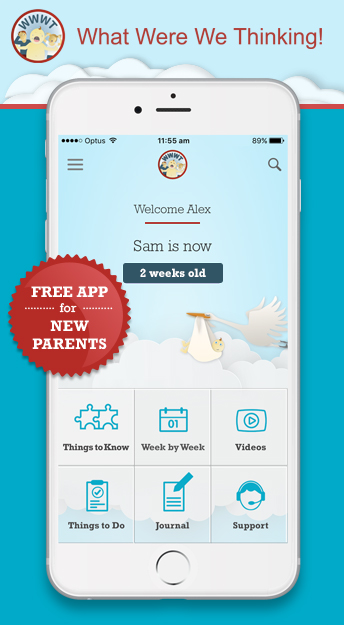Expectations of motherhood

In society, pregnancy and motherhood are often represented in unrealistic, idealised ways. If a woman and/or her partner’s expectations are very different from the reality, it can make it harder for them to adjust to life with a new baby. Women may set themselves unachievable goals and then become overwhelmed, find it difficult to cope, or feel as though they’ve failed.
It’s helpful to remember that adjusting to life with a new baby is enormously challenging and it can take time. Having realistic expectations of what pregnancy and motherhood involve can help women better adjust to life with a new baby.
Here are some of the myths and misconceptions surrounding pregnancy and motherhood, along with some strategies that may be useful during this time.
‘Motherhood is natural and intuitive’
The belief that women have an innate knowledge about how to care for a baby.
Mothering does not come ‘naturally’ to all women simply because they are women and is instead a demanding job that requires new skills that can take time to acquire.
‘Life won’t be that different with a new baby’
The belief that a baby can be easily accommodated into your existing lifestyle and routine. Many couples talk quite proudly about how “the baby will not change our lifestyle” or “the baby will have to fit in around us”.
However, the responsibility of caring for someone who is small and vulnerable and totally dependent is demanding and can be overwhelming. Day-to-day life will change to adapt to the baby’s feeding and sleeping schedule.
‘Supermum’
The belief that women can (and should expect to) have it all – maintain a career, study, raise children and manage the household.
It is estimated that a new baby will initially contribute 30-40 hours a week of extra work to the household. To accommodate this extra workload, changes to everyone's routines will be required. Juggling motherhood with study, a career or household tasks is not easy and requires more than just good planning.
‘Babies are always delightful’
The belief that all babies are cute, happy, and feed and sleep normally all of the time.
Whilst babies are delightful they also cry, vomit, poo and keep you awake at night. At times, their behaviour can be unpredictable. Babies are new human beings who are still learning about this world and need help to do this.
‘Pregnancy is a wonderful and enjoyable experience’
The belief that all women love being pregnant and embrace every change pregnancy brings.
Some women find the changes pregnancy brings difficult to adjust to and are actually relieved when it is all over.
‘Pregnant women glow’
The belief that women look and feel great throughout their pregnancy.
Morning sickness, backaches and the fatigue commonly associated with being pregnant can leave women feeling anything but ‘glowing’.
‘Motherhood is the fulfilment of womanhood’
The belief that having a baby is a woman’s most important achievement.
Society places a great deal of pressure on women to become mothers, however women can have fulfilling lives without children. Those who do become mothers do not always feel that their life is complete after having a child. Women who had many other interests prior to having a baby may find they miss aspects of their old life, such as the mental challenges of a career, or adult company.
‘Yummy mummy’
The belief that women must always look ‘attractive’, and can regain their pre-pregnancy body within a few months of delivery.
There is a pervasive attitude that a woman’s body is her most significant attribute and must conform to unrealistic and detrimental ideals of beauty. The reality is that some body changes that occur during pregnancy will always remain (e.g., stretch marks) and it can take a long time to lose the weight gained.
‘Breastfeeding is natural, so it’s easy’
The belief that breastfeeding comes easily to all women.
Many women find breastfeeding challenging, and at times even painful. Women may be concerned whether they have the correct latch and technique, if baby is getting too much or not enough milk, or is tongue-tied. Cracked nipples, engorged breasts, mastitis, leaking breasts, thrush, and blocked milk ducts are also some issues that can cause women great pain or discomfort while breastfeeding.
Breastfeeding is a skill that must be learned, and may even require expert help or advice for success.
Strategies
Discuss expectations of pregnancy and parenthood with your partner
Many factors can influence a person’s ideas about parenthood. Discussing expectations and coming to a shared understanding about how changes a new baby brings will be managed can reduce disappointment and future conflict (e.g., ideas around settling, feeding, crying, and managing housework.
Establish realistic ideas of pregnancy/post-baby life
Re-evaluate what can really be achieved during the later stages of pregnancy or with a new baby in the house. For example, the house may not be as clean as usual or visits to the gym may be less frequent. It is important that both partners have a clear understanding and agreement on what compromises they are willing to accept.
Establish contacts with other expectant and new mothers
This is particularly important if family and friends are not close by. Other parents can provide reassurance and reduce any feelings of isolation. This can be both face-to-face and online groups.
Keep mentally and emotionally healthy
Taking action to support mental and emotional health can help to manage the challenges of this time in life and improve overall wellbeing. This can make the experience of being a new parent more enjoyable, which in turn, will have a positive impact on baby. Actions might include signing up to birthing and parenting classes, maintaining connections with friends and social groups, or setting aside alone time each day.
Article from Women’s Health Queensland Wide Inc., a not for profit, health promotion, information and education service for women and health professionals throughout Queensland. Further information here. Originally published in Queensland Women’s Health Network News, Issue 1 2017, pp. 1-2.
Posted in: A new reality Baby 0-4 weeks Baby 5-8 weeks Growth and development Health Professionals Late pregnancy Your needs









